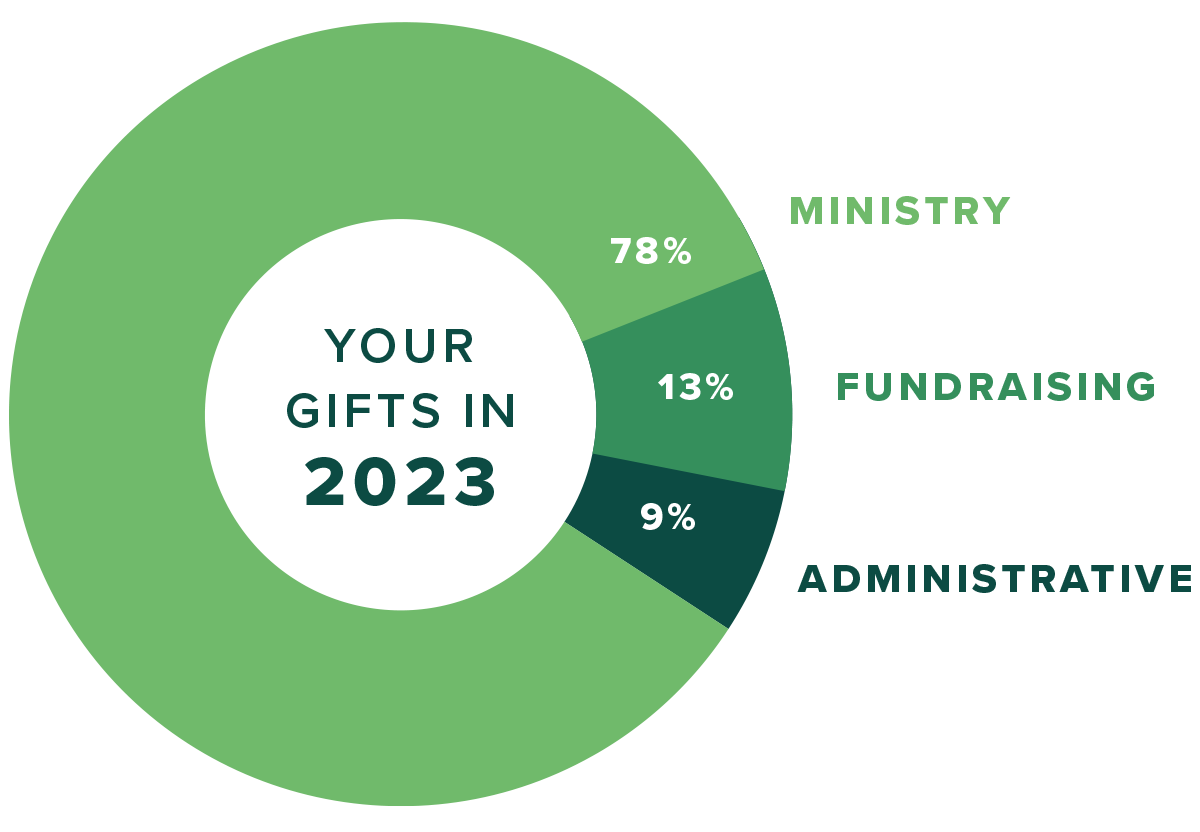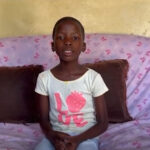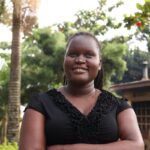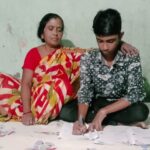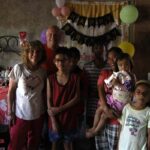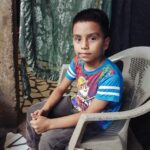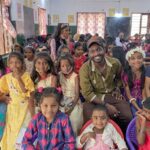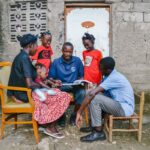Child Champions of Visions of Hope Christian School sacrifice time with their own families and the comforts of life in the city to raise up future leaders from the Palaw’an tribe in a remote, mountainous area of the Philippines.
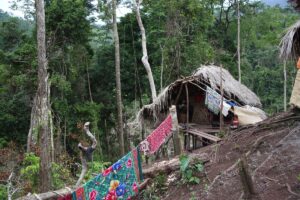
A typical Palaw’an house in the jungle in a remote and mountainous region in the Philippines.
“I cannot just turn a blind eye to children who are in need,” says Emma Brillo, Visions of Hope Christian School principal.
Known as “Teacher Bing” to many, Emma left her comfortable life in the city and a higher-paying job to join the work of Visions of Hope (VOH) Christian School in Palawan in the Philippines.
She says it was God who moved her and opened her eyes to see the needs of the Palaw’an children who live in this remote, mountainous region.
That’s why she and other teachers have sacrificed so much to help these kids living in poverty.
Most of the teachers here are from other parts of the country or the province. They left the comfort of their homes, traveling far from their families, to serve in the school. They had to learn the language and culture of the Palaw’an tribe to be effective in their work.
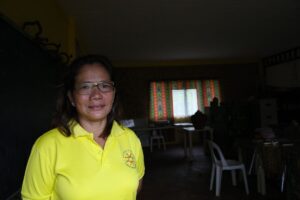
Emma Brillo, also known as Teacher Bing, is principal at Visions of Hope Christian School.
The teachers may not be from this area, but they are familiar with the struggle of life in the mountains.
They’ve learned to endure daily long-distance walks on narrow roads and over muddy terrain, crossing several rivers, and hiking up and down the mountains to get to the school and the homes of the children.
Life is hard, but this daily struggle, fueled by passion, is repaid by indescribable joy.
“God has chosen us to be a living testimony to many children in this community, and it’s a great privilege for us,” says Sarah Jane Sombiangan, who has taught at VOH Christian School for two years.
Hardship in Paradise
Of the 7,641 islands that make up the Philippines, Palawan is the largest in area covered by a single province. Only 25 miles wide, it stretches 250 miles in length. Palawan is considered one of the most beautiful islands in the world because of its natural, untouched scenery.
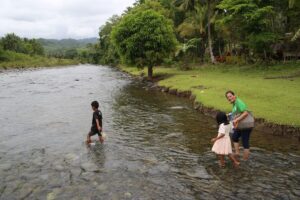
Teacher Bing helps children cross a river.
It is a popular tourist destination because of its pristine beaches and two UNESCO World Heritage Sites — the Puerto Princesa Subterranean River National Park and the Tubbataha Reef Marine Park.
Palawan Province also beams with vibrant culture.
Several tribal groups live in the province, some in the lowlands where they have easy access to basic needs like food, hospitals, education, and other government services, while others live in remote mountain villages where life is a struggle.
One of these mountain tribes is the Palaw’an.
Palaw’an Tribe: Beauty and Struggle
The Palaw’an are a shy but hardworking people with a beautiful culture. They also face hardships from both their isolation and certain traditions.
Known for incredible craftsmanship, they build their small huts on mountainsides using wood salvaged from forests. Many women are skilled in making crafts like floor mats, bags, storage containers, and ornaments using indigenous materials like palm leaves.
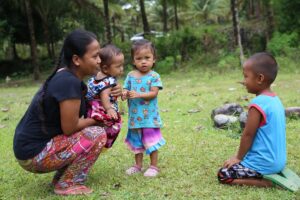
A Palaw’an family in the Philippines.
Palaw’an people farm for a living. They plant rice, cassava, bananas, and some vegetables, which they sell to earn a living.
Traditionally, Palaw’an use the kaingin farming method — burning down residual crops to plant again. This method destroys soil fertility.
When they can no longer grow good crops on a particular piece of land, they move on to another area and repeat the process.
When there is no more land to farm in their area, families go to other mountains to farm.
They do this so they can continue to feed their families.
They also gather firewood or make charcoal to sell. Palaw’an children help their parents gather wood and food from the forest.
It’s a simple life they’ve managed to sustain for many years despite the hardships in the mountains. But sometimes the food they grow in the mountains isn’t sufficient to meet their needs.
Hunger and Disease Common
Malnutrition is one of the biggest challenges for the Palaw’an tribe. When food is scarce, they eat only bananas and cassava for several days. Sometimes they brave the strong water current in the river to catch freshwater fish or hunt for wild pigs.
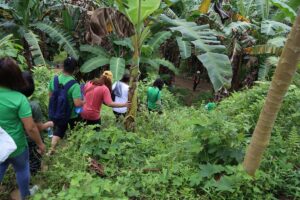
Children walk through the forest to reach the school.
With little food, the immune system weakens, and children are the first to suffer.
Common health problems among the kids are respiratory tract infections, iron deficiency, and skin problems.
Malaria is another health problem the Palaw’an face, and it can be deadly if not treated.
But there is no nearby hospital in the mountains for immediate medical treatment.
Since Palaw’an traditionally rely on natural remedies, animism, or quack doctors, they lack proper health intervention for malaria and other preventable diseases, putting their health at high risk.
Education Halted by Child Marriage
Many Palaw’an girls marry as early as 14. Marriage is usually arranged by their parents as a way to bring relief to their families. They believe that by marrying their daughters off early, the husband will be responsible for providing for them.
These girls feel they have no choice, forcing them also to give up their education, especially when they start having children.
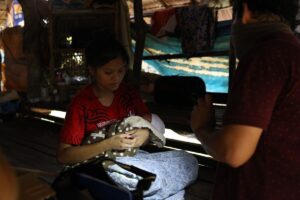
A Palaw’an girl holds her baby. Many Palaw’an girls marry as early as 14.
Lack of education has been a challenge in this area, not only because the children need to work or marry to help their families, but also geographically.
Children walk about three to four hours to get to the nearest school, passing through rivers, valleys, and mountains.
No wonder very few graduate from high school.
Visions of Hope at Hand
But even in their remote mountain home, the Palaw’an are not forgotten.
Seeing the plight of the Palaw’an children, the Visions of Hope Foundation established its Christian school here in 2011. It is situated at the top of a mountain, closer than the school in town.
For the past four years, Visions of Hope Foundation has partnered with OneChild. Two of OneChild’s 33 Hope Centers in the Philippines are in partnership with VOH — one in Palawan and another in Mindanao. Of the 233 children in the program, nearly half are Palaw’an children.
Through the help of sponsors, children receive free education in the VOH Christian School, uniforms, school supplies, nutritious meals, health care, biblically based lessons, sports activities, and other developmental programs that will help shape their future.
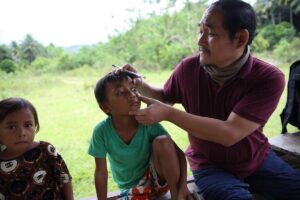
Dr. John Tabiji conducts health checkups on the children.
Most important, children receive love and care from Child Champions like the dedicated teachers who are willing to sacrifice so much to help them thrive.
Through OneChild, these kids are also connected to loving sponsors with whom they can build a relationship through letters.
“It was hard before when we used to go to the school down the mountain,” Norcelyn, a parent, says.
“My parents did not have a dream for me. They told me to just marry. By God’s grace, my children learned to read and write, and even spiritual things like praying and the fear of God. These things are not taught [at the school] down there. I want my children to become teachers and teach here, too.”
Hope Beyond the Hope Center
The VOH Christian School provides fully equipped and child-friendly classrooms, a vegetable garden where children can get food to bring home to their families, a playing field, and a school gym where they can freely run and play.
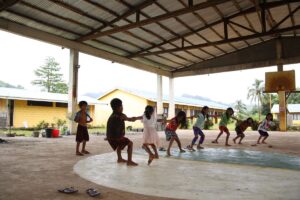
Children play in the school gym.
These spaces help kids have positive learning experiences through games and other school activities.
The school is a safe place where kids can escape the burdens of a difficult life and just be kids.
The school also has a clinic that has become a community pharmacy because they have medicines for simple coughs and colds, fevers, and stomachaches.
Families of the students also have access to the clinic. Families also go to the clinic when they need first-aid treatment for minor accidents like cuts and burns.
The teachers ensure they have stocks of medical supplies, as their local community health clinic usually runs out of supplies. They also provide illustrated reading materials and lessons on how to prevent malaria.
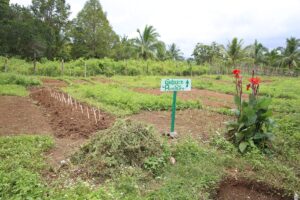
The school even has its own garden.
At times VOH brings doctors and dentists from the city to hold a medical mission in the school. It gives the Palaw’an people a chance to get professional medical service they rarely receive.
Thanks to the teachers, OneChild sponsors, and donors of VOH, the school here is saving lives.
An Eye-Opening Experience
When one sponsored child named Redel recovered from a life-threatening illness with the help of the teachers, it opened an opportunity for teachers to change a wrong mindset toward doctors and getting proper health care.
“It was an eye-opener for the people here that they should not fear for the doctor and that there are a lot of people willing to help them,” says Teacher Bing.
Since then, Palaw’an families have been more willing to learn from the teachers. Little by little, they are thinking of a better life for their children.
Visions for the Children
“Every child is a vision of hope, not just one child but all. No one will be left behind. This is our mission and vision,” says Sarah Jane.
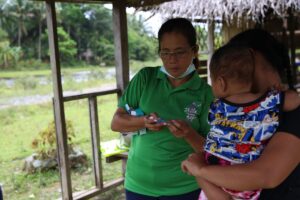
Teacher Bing explains to a parent how to administer medication to her child.
This vision is passed on to the parents by engaging them to be involved in their children’s development.
They hold parents’ meetings where they teach about parenting, livelihood skills, and other Bible-based life lessons.
They also provide basic education to parents who cannot read or write. These teachers could not do it without building a relationship with the parents.
With all this help from the teachers, more and more parents are starting to have visions of the future for their children.
“I dream for my children to finish school and get a job according to God’s will,” says Joey, a father of two children. He never went beyond high school because he needed to work to support his family.
Benjamin, a grandfather of three children in VOH Christian School, used to dream of becoming a lawyer, but because of poverty and marrying young, he was not able to pursue his dream.
“My parents gave up on me, on my education, because of poverty. That is why I’m thankful that there is a school here. My grandchildren go here.”
“I was only 14 years old then when my father arranged me for marriage,” Jenalyn, a mother, says. “I am thankful that my children can go to school. I wish they will become a teacher, a soldier, or a doctor.
There Is More to Do
Even with the school on the mountain, many students who live far away still find it difficult to walk long hours to get to school. Some students come to school with cuts on their feet because they are walking barefoot, a method they prefer to walking with shoes or flip-flops which the children say only makes their walk more difficult and slippery.
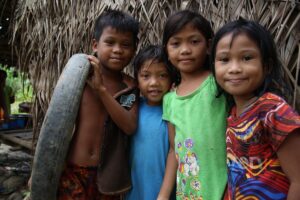
Palaw’an children pose for a portrait.
This causes them to miss their classes, and at some point, discourages them from continuing their schooling.
That is why VOH is praying to have a residential home or boarding school that will provide them a place to sleep and nutritious meals so their studies will not be hindered by this daily struggle.
In addition to health and education, cultural preservation is also part of their vision.
The teachers seek to preserve the beautiful elements in the Palaw’an culture while changing some cultural practices that hinder the kids from reaching their dreams.
“Even if the child wants to continue his or her study, if the parents like to arrange early marriage, the child has no choice but to accept it. Our school gives a glimpse of hope for those children who want to fight for their dreams, and we are seeing that now,” says Sarah Jane.
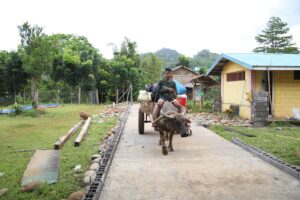
A carabao pulls a “carosa,” or carriage, which is the primary mode of transportation when the river is high.
“For the time, early marriage among children becomes lesser than before. We think it’s because God is also molding the hearts of their parents as they listen to the Word of God.”
Another ray of hope in this hard place came in January 2022, when the Philippine government passed the anti-child marriage law.
“We hope to see life transformations of these children while the essence of their culture is being preserved because that is their identity,” Teacher Bing says.
“We are thankful for the help of the sponsors that we can reach them.”
The selfless love of the teachers at Visions of Hope Christian School, supported by the sacrificial giving of faraway sponsors and donors, is helping Palaw’an children thrive so they can both shape and preserve their heritage for generations to come.
These teachers from Visions of Hope Christian School could not do this work alone. They need more Child Champions like the sponsors who empower them to change more lives and raise future teachers, doctors, nurses, and leaders. Let’s join their cause in fighting for the children’s rights and dreams.
Learn the importance of telling a child’s story:
We are accountable to the children we serve AND to our donors.
Our accountability to our donors is one of our highest priorities. Our goal is to use the funds entrusted to us as wise stewards. To do this requires continued monitoring of our fund distribution. OneChild is also a member in good standing with the Evangelical Council for Financial Accountability (ECFA)
